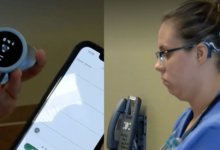‘Severe shortage’ of digital nurses, warns Phillips Ives review

There is a “severe shortage” of digital nurse specialists to deliver the technology-driven ambitions of the NHS over the next two decades, a leaked NHS England review has warned.
The Phillips Ives Review, seen by Nursing Times, has called for greater investment in the digital specialist workforce, and education reforms to equip the next generation of nurses and midwives with the skills they need to deliver digitally enabled practice.
The review said that the roles and functions of the nursing and midwifery workforce would “need to change” over the next 20 years if the benefits of technological developments in healthcare are to be realised.
Importantly, nurses will need to acquire new skills and competencies to meet this need, including in genomics, artificial intelligence (AI) and data science.
The Phillips Ives Review into the digital readiness of nurses and midwives was launched in 2022 as a year-long research project.
Led by Dr Natasha Phillips, former chief nursing information officer at NHS England, and American nursing academic, Dr Jeanette Ives Erickson, the review has explored what skills and training the workforce might require when working with new technologies in the coming years.
The findings of the review follow extensive consultation with nurses and midwives working across all health and care settings in England.
Nursing Times reported the early findings of the review last year, with the expectation that it would be published in 2023 by NHS England.
Despite the rapid advancement of digital technologies in healthcare, and the growing demand on nurses to become more digitally competent, the review has still not materialised.
However, Nursing Times has seen a leaked copy of the report and has summarised the key findings.
Nurses will need new digital skills going forward
The Phillips Ives Review has proposed that, in the next 20 years, nurses and midwives will deliver person-centred care which is supported by digital interventions.
For example, it said nurses would spend “less time documenting and retrieving information and more time acting on it”.
It comes as the NHS continues to move away from paper records and instead adopting electronic health records (EHR), while the use of remote monitoring and diagnostics is also increasing so people can access treatment from their homes.
As technology continues to advance across healthcare systems, nurses will need to acquire “new competencies and capabilities”, many of which are currently “poorly understood”, the review warned.
It said that current models of nursing and midwifery education were “not generally designed to develop and maintain digital literacy”, nor did they equip students with understanding about the ethical issues of digitally enabled practice.
Therefore, the review has proposed several nursing education reforms to ensure that the workforce is fit to deliver digitally enabled practice “now and in the future”.
“The variation across education programmes highlights the need for there to be a clear consensus of what digital skills and knowledge nurses and midwives should be able to demonstrate at the point of registration,” said the report.

Natasha Phillips
One proposal in the review is for nurse education to be updated so that it embeds AI, digital technology and data science into the curriculum, which it said can be delivered in the classroom and on placement.
Participants of the review noted that exposure to digital technology on placements varied and was often dependent on the “digital maturity of each practice environment”.
Concerningly, they warned that some education providers “offered no digital health and care learning opportunities” at all.
The review noted “strong support” to generate practice placements with digital nurse and midwife specialist teams, data teams and virtual wards.
Meanwhile, the paper proposed that there should be a defined digital competency and capability framework, which education institutions could use to underpin development and delivery of pre-registration training programmes.
The framework should be relevant to current practice and should be able to evolve and adapt to future changes.
Frameworks such as these, which are already being used in countries like America and Australia, can also be incorporated into employment, as organisations can use it to outline the skills and knowledge needed to perform specific roles, said the report.
The review argued that a competency and capability framework could allow the development of a “digital passport”, whereby organisations can monitor the “current competency level” of the workforce and use it to inform training to support them to progress.
Developing the specialist workforce
While all nurses and midwives should be capable of using technology and data, some parts of the workforce “will need additional knowledge and skills to lead digital transformation”, said the review.
Recent estimates by Health Education England, before it merged into NHS England, proposed that 0.14% of the NHS workforce should be in digital specialist roles by 2030 – an additional 32,000 whole time equivalent staff compared with 2020 – “if the NHS is to realise its ambitions for digital transformation”.
However, the Phillips Ives Review found that there was a “severe shortage of digital nurse and midwifery specialists to deliver the digital future”.
Concerningly, some NHS organisations have still not appointed any nurses or midwives with expertise in digital transformation.
“Within a short timeframe, AI will be more commonly integrated into medical devices and technologies that nurses and midwives use daily”
Phillips Ives Review
The report concluded that there was currently no global understanding of the role of the specialist digital nurse or midwife.
Despite the “highly specialised nature of the work”, the role of the specialist digital nurse or midwife has evolved through “an informal approach to date”, it added.
The informal nature of a digital career pathway for nurses has led to “variation in the level of seniority and renumeration for the role”, which could in turn impact recruitment and retention in the specialism.
As such, digital nurses have demanded a specialist career pathway, supported by a competency framework, as well as education programmes for nurses wanting to pursue digital as a specialism.
The review noted that some nurses might want to pursue digital all the way to advanced practice level and called for this to be facilitated through formalised specialist digital education.
This should include a programme of education that “acknowledges the autonomy, complex decision-making and higher levels of judgement associated with these specialist roles, akin to that required in advanced practice”, it said.
Exploiting data and science
The Phillips Ives Review has placed heavy emphasis on the need for nurses and midwives to have better understanding of genomics, AI, data science and research and innovation.
While some parts of these will remain with specialists, many will be “embedded in routine healthcare delivery”, it said.
For example, the nursing and midwifery workforce are set to play a key role in “efficiently, appropriately and equitably deploying genomic technologies” to support people to understand how their health may be affected by their genetics.
For this to be achieved, the review called again for pre-registration education to include mandatory genomics training “to ensure there is no knowledge gap”.
“As genomics is rapidly evolving, from a niche area to a necessity, education programmes need to be regularly updated to remain current,” said the review.
Meanwhile, it noted that the use of AI in healthcare was also expected to become the norm in the coming years and therefore current and future nurses “will need to be confident in integrating AI technologies into their practice”.
“Within a short timeframe, AI will be more commonly integrated into medical devices and technologies that nurses and midwives use daily,” said the review.
Importantly, it said that nursing and midwifery voices “must be heard in the shaping of future AI and robotics developments” going forward.
Equity in digital transformation
While digital technology has “enormous potential to reduce health inequalities”, it equally has the power to exacerbate them, said the report.
Nurses and midwives will play a pivotal role in ensuring that digital transformation is equitable for both staff and patients.
For example, the review said it was vital for new technology to be introduced “in an inclusive way that respects workforce and people’s diversity”, noting that some staff may be more hesitant to ask for help than others.
Nurses and midwives must also engage with underrepresented and marginalised groups “to prevent people from being disadvantaged or excluded by digital transformation and to narrow health inequalities”.
Digital nurse leaders and nurse specialists should make sure that a patient’s access and experience will be considered before any form of digitalised care is designed, procured or implemented in their care, said the review.
It comes as some people who do not have access to the necessary connectivity or equipment “risk being excluded”, warned the report.
Taking a cautious approach will also “prevent digital transformation being perceived as a burden” and will help tackle worries that AI and other digital technologies could threaten the delivery of care by a human.
Meanwhile, the review argued that, as healthcare is increasingly moving away from paper documentation to EHR, it was important that all clinicians were clear on the standards for the digital recording and sharing of health data.
“This is particularly important for nurses and midwives, who arguably have the most contact with people and as documenting each stage of care is core to their role,” it said.
Conclusions
The review concluded that nurses and midwives of the future need to work in health and care environments where:
- The health and care system is digitally mature, defined by evolving standards and a minimum level of digital foundations
- Systems and processes are in place that support a standardised approach to ways of working and the ability to identify unwarranted variation
- Nurses and midwives are confident in using and harnessing the potential of digital technologies and data in the workplace
- Nurses and midwives are ready to adapt and evolve their roles and ways of working
- The pace of change in practice is matched by pre-registration and registered nurse and midwife education and training
- Data is routinely captured for nursing and midwifery practice outcomes
- Data consistently informs evidence-based nursing and midwifery excellence and service improvement
- Nurses and midwives are equipped with the tools to support practice and to use data to drive improvement and for research
The Phillips Ives Review, when it is finally published, will propose that the findings are taken forward alongside the NHS Long Term Workforce Plan and the upcoming chief nursing officer for England’s professional strategy for nursing and midwifery.







